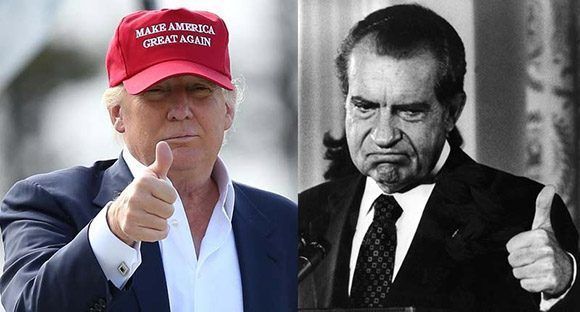
Make Nixon Blush
“Slack for the President?” is the subject line on a memo that Brett Kavanaugh, President Donald Trump’s nominee for the Supreme Court, wrote on August 15, 1998—almost exactly twenty years ago—which was released by the National Archives on Monday. Kavanaugh was then a lawyer working with Ken Starr, the independent counsel investigating President Bill Clinton, and the memo was addressed to Starr and “All Attorneys” on the team. Kavanaugh wrote that, when the time came to question Clinton about his relations with Monica Lewinsky, a former White House intern, the language about sex acts should be explicit, “to make his pattern of revolting behavior clear.” (He included a list of sample queries, which included references to ejaculation and a cigar, though he said he would leave “the best phrasing to others.”) One of Kavanaugh’s rationales, though, sounds as much personal or even political as legal: he told Starr that Clinton had “tried to disgrace you and this Office with a sustained propaganda campaign that would make Nixon blush.”
Making Nixon blush—even Nixon—is an image that is useful as a shorthand for shockingly shameless Presidential wrongdoing, even if, as a historical matter, it doesn’t quite fit the personality of the man. Richard Nixon was not exactly an unflappable operator; he embodied a mix of arrogance and awkwardness, savvy instincts and insecurity, seething aggression and sulky resentment (not to mention bigotry) that generations of biographers are still trying to sort out. He also resigned, perhaps with a sense of shame, in the face of impeachment. But the Nixon experience has become, in our time, a metaphor, a charge, and even, oddly, a distorted means of defense—as when Trump recently said that his White House counsel, unlike Nixon’s, was not a “RAT.” It can be useful to ask whether the allegations around Trump, and his party’s response to them, are or aren’t Nixonian, or do or don’t resemble Watergate, but at some point one also has to explore how distinctly Trumpist they are.
It seems clear, though, that Kavanaugh meant that Nixon had an enemies list, and that Clinton, in his view, effectively had one, too—with Starr’s name on it—and had a sharper sense than his predecessor did of how to use it. At the time, the Clintons and their allies were making the case that the web of investigations into them was part of what Hillary Clinton called “a vast right-wing conspiracy,” and that Starr himself was personally biased and engaged in an ideologically motivated vendetta. But where is the logical connection between being unfairly attacked and deploying anatomical terms that would make, really, anyone blush?
Kavanaugh also argued that what the Starr team believed was Clinton’s past perjury on the matter increased the need to be explicit. That’s a reasonable enough point; Bill Clinton was a master parser. And reading one of Kavanaugh’s angrier lines—“The President has disgraced his Office, the legal system, and the American people by having sex with a 22-year-old intern and turning her life into a shambles—callous and disgusting behavior that has somehow gotten lost in the shuffle”—one might disagree with the range of institutions he sees as having been disgraced (the whole legal system?), but his sympathy for Lewinsky comes through. That particular expression of decency with regard to a young woman is not likely to hurt him in the confirmation hearings, especially with the benefit of the insights from the conversations around #MeToo, nor should it.
Starr did not use Kavanaugh’s most explicit questions, in the end, and in the years that followed, Kavanaugh, in his writings, expressed doubt about the usefulness to the country of aspects of the investigation. (To some extent, Starr has, too.) In particular, he has questioned whether a President can be indicted (as opposed to being impeached) while in office. The issues raised are hardly academic, given the investigations surrounding the President now and his fierce attacks on the Mueller investigation, which go well beyond anything that the Clintons came up with against Starr. (The decision by his former lawyer, Michael Cohen, to plead guilty to charges related to campaign finance and the Stormy Daniels hush agreement, on Tuesday, will only accelerate those.) Kavanaugh, in his confirmation hearings, will also almost certainly be asked about some of his judicial decisions, in which he adopted expansive views of executive power, which, particularly in the area of national security, might make a lot of Presidents blush.
More than that, it would be worth asking Kavanaugh whether looking back at his own angry words about Clinton has caused him to reflect on how those with power, whether investigative or political, respond when they decide that they are surrounded by enemies. The ways in which they do so are not necessarily constructive or proper—Trump, for example, has persuaded himself that it does not count as obstruction of justice if “I just fight back.” Has Kavanaugh reassessed the motives that drove him back then? And how much slack, and for whom, would he cut now?

